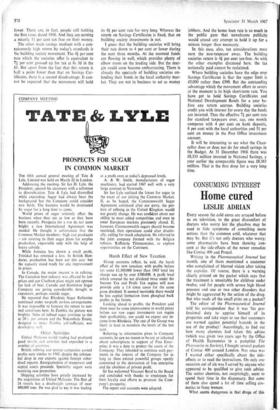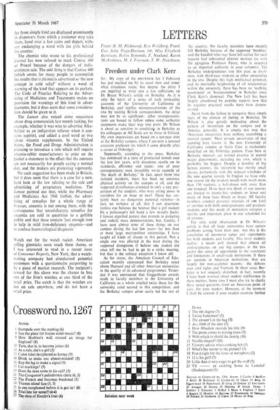Home cured
CONSUMING INTEREST LESLIE ADRIAN
Every season the cold cures are arrayed before us on television, to the great discomfort of doctors who worry lest the placebos may be used to hide symptoms of something more serious than the common cold, whatever that may be. But it's not only doctors who worry; some pharmacists have been showing con- cern at the side-effects of the newer remedies like Contac 400 and Procol.
Writing in the Pharmaceutical Journal last month, one of them mentioned a customer who complained of blurred vision after taking the capsules. Of course, there is a warning clearly printed on the packet which says that the treatment is unsuitable for children under twelve, and for people with severe high blood pressure and one or two other disorders that might be aggravated by the action of the drug. But who reads all the small print on a packet?
The editor of the Pharmaceutical Journal told his correspondent that it was 'his pro- fessional duty to apprise himself of its properties and take steps to see that customers are warned against potential hazards in the use of the product.' Accordingly, to find out how many chemists had taken this advice (which was given two years ago by the Office of Health Economics in a pamphlet The Pharmacist in Society), I bought several packets of Contac 400 around London. Not once was I warned either specifically about the side- effects or to read the instructions. On only one occasion out of six was I served by anyone who appeared to be qualified to give such advice. The senior chemists, not surprisingly, seem to spend their time in the dispensary. But some of them also spend a lot of time selling cos- metics to fussy women.
What seems dangerous is that drugs of this far from simple kind are displayed prominently in dispensers from which a customer may take them, hand over a few coins and depart, with- out exchanging a word with the girls behind the counter.
The chemist who wrote to his professional journal has now refused to stock Contac 400 or Procol because of the dangers of indis- criminate sale. The odd thing is that Contac 400 (which seems for many people to accomplish the results that it claims) is advertised as 'the new concept in cold relief' without a word of warning of the kind that appears on its packets. The Code of Practice Relating to the Adver- tising of Medicines and Treatments makes no provision for warnings of this kind in adver- tisements, but it does seem that some considera- tion should be given to it.
The Lancet also voiced some uneasiness about drug commercials last month (asking, for example, whether it was wise to advertise Alka- Seltzer as an indigestion reliever when it con- tains aspirin), and added a cool word or two about vitamin supplements. In the United States, the Food and Drugs Administration is planning to introduce a rule which will require vitamin-tablet manufacturers to print on the packet a statement to the effect that the contents are not necessarily for people eating a normal diet, and the makers are protesting vigorously.
No such suggestion has been made in Britain, but it does seem that' there is a case for a new, hard look at the law relating to the sale and advertising of proprietary medicines. The Lancet pointed out that, while the Pharmacy and Medicines Act 1941 forbids the adver- tising of remedies for a whole range of diseases, anaemia is not among them, with the consequence that unsatisfactory remedies for anaemia are sold in quantities to a gullible public and that these contain 'just enough iron to help in mild iron-deficiency anaemia—and to confuse haematological diagnosis.'
Watch out for the watch racket. American selling gimmicks soon reach these shores, so I was interested to read in a recent issue of Consumer Reports, New York, that a watch- making company had circularised potential customers with a questionnaire purporting to be a piece of market research. The recipient's reward for this chore was the chance to buy one of the firm's watches at one third of the retail price. The catch is that the watches are not on sale anywhere, and do not have a retail price.































 Previous page
Previous page